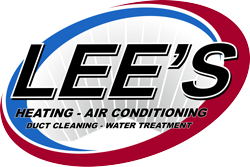While maintaining good air quality in your home or building is necessary throughout the year, these needs will often be heightened during the coldest parts of the winter. There are a few reasons why indoor air quality risks get a bit higher this time of year, but also some simple steps you can take to avoid these becoming problems in your space.
At Lee’s Heating and Air, we’re happy to offer a number of air quality services to clients around Utah, including air purifiers, humidifiers and more. We’ll help you keep your air in great quality year-round, particularly during the current winter period. Why does winter often lead to more significant air quality risks than other seasons, and what can be done to avoid these risks? Here’s a simple rundown.
We Spend More Time Indoors
One of the simplest explanations for why air quality risks are higher in winter is that we tend to spend more time indoors during this period. As a result, the air inside our buildings is becoming stagnant and old, reducing its freshness and leading to an increase in potential particles and bacteria.
Not only this, but the potential for contaminants to build up in the air is also heightened. Poor ventilation, dust mites and pet fur all have the potential to increase in concentration when we spend more time indoors during winter.
Humidity Levels Drop
Indoor air quality can also be affected by humidity levels. During winter, these tend to drop – moisture from radiators or warmers will commonly be lost into the atmosphere, leading to air that is drier than during other times of year. This can cause problems for those with respiratory issues, as dry air can increase chest and throat irritation.
This is especially common in a dry place like Utah, where humidity levels tend to be lower at other points of the year as well.
Knowing the Possible Contaminants
In many cases, simply being aware of the contaminants that could be at higher risk for impacting your space will help you avoid those risks. Here are some of the most common:
- Outdoor sources: This can include anything from exhaust fumes to pollen. Pollen levels tend to be higher during the springtime in Utah, but it’s still important to make sure air coming into your building is as clean as possible. Another major outdoor source of contamination in some homes is radon, which is a naturally occurring gas.
- Pets: It’s not just humans who spend more time indoors during winter – pets can also be a source of contamination during the colder months. Pet fur, dander and even urine can all lead to increased air quality risks if left unchecked.
- Household cleaning products: Many people use different types of cleaning products to try and keep their homes clean and safe, but these can often contain volatile organic compounds (VOCs) that can be hazardous if left in the air too long. Switching to natural or unscented cleaning products will help reduce this risk.
- Combustion sources: Various combustion sources can be found in homes, such as gas stoves and fireplaces. Make sure that your chimney is ventilated properly when using these, as carbon monoxide buildup can be a serious health hazard.
- Building materials: While this is less common today than in past decades, it’s still possible to find toxic building materials such as asbestos in older buildings. This is especially true when renovating or repairing an existing property.
- Any indoor home improvements: If you’re doing any kind of construction or home improvement in your space, be aware of the potential for indoor air quality risks. Make sure that you use low-VOC products when possible and keep windows open during the work to ensure indoor air is constantly being exchanged with fresh outdoor air.
General Winter Air Quality Tips
In addition to the expertise we listed in some of the areas above, here are some simple best practices for maintaining air quality in your space this winter:
- Maintain filters: Properly maintained air filters are essential for avoiding air quality risks. Make sure to replace them at least once every two months, and more often if you have pets in the home or find yourself using your heating system more than usual.
- Ventilation: Keeping proper ventilation is as important during winter as any other time of year – use fans and open windows to help air circulate if your space isn’t ventilated properly.
- Proper maintenance: Make sure to maintain all of your heating and ventilation systems according to manufacturer’s instructions, as this will help reduce the risk of natural contaminants building up in the air.
- Consider air quality upgrades: If your home has particular air quality issues, or if you have people with extreme allergies or other sensitivities, consider upgrading your air filtration system to help reduce the risk of contaminants.
With a few simple steps, you can make sure that your indoor air quality is as safe and healthy as possible during winter. Follow these tips and talk to an expert if you have any questions about how to further improve the air in your home or building.
And at Lee’s Heating and Air, we are always here to answer all your questions and help you find the solution that best fits your needs. Contact us today to learn more!


